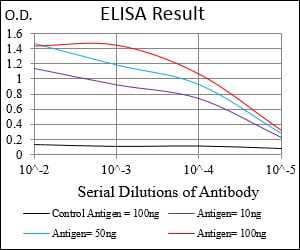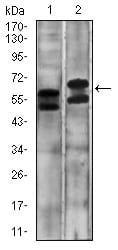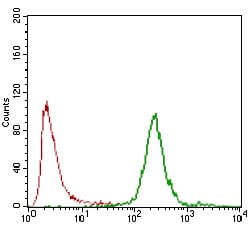


| WB | 1/500 - 1/2000 | Human,Mouse,Rat |
| IF | 咨询技术 | Human,Mouse,Rat |
| IHC | 咨询技术 | Human,Mouse,Rat |
| ICC | 技术咨询 | Human,Mouse,Rat |
| FCM | 1/200 - 1/400 | Human,Mouse,Rat |
| Elisa | 1/10000 | Human,Mouse,Rat |
| Aliases | MN; CAIX |
| Entrez GeneID | 768 |
| clone | 10F7A8 |
| WB Predicted band size | 49.7kDa |
| Host/Isotype | Mouse IgG1 |
| Antibody Type | Primary antibody |
| Storage | Store at 4°C short term. Aliquot and store at -20°C long term. Avoid freeze/thaw cycles. |
| Species Reactivity | Human |
| Immunogen | Purified recombinant fragment of human CA9 (AA: 37-186) expressed in E. Coli. |
| Formulation | Purified antibody in PBS with 0.05% sodium azide |
+ +
以下是关于CA9抗体的3篇参考文献概览:
1. **"Monoclonal antibody G250 recognizes a determinant present in renal cell carcinoma and absent from normal kidney"**
- **作者**: Oosterwijk, E., et al.
- **摘要**: 该研究报道了单克隆抗体G250的特性,证实其特异性识别肾细胞癌(RCC)中的CA9抗原,而在正常肾组织中无表达,为CA9作为肿瘤标志物及抗体靶向治疗奠定基础。
2. **"Cloning and characterization of MN, a human tumor-associated protein with a domain homologous to carbonic anhydrase and a putative helix-loop-helix DNA binding segment"**
- **作者**: Pastorek, J., et al.
- **摘要**: 首次克隆并鉴定CA9(MN蛋白),揭示其在多种肿瘤(如宫颈癌、肾癌)中的高表达,与缺氧微环境相关,为后续CA9抗体的开发提供分子基础。
3. **"Prognostic significance of carbonic anhydrase IX expression in renal cell carcinoma: implications for antibody-based therapy"**
- **作者**: Bui, M.H., et al.
- **摘要**: 分析CA9在肾癌中的表达与预后的关联,提出靶向CA9的抗体(如cG250)在免疫治疗中的潜力,支持其作为临床治疗靶点的可行性。
4. **"Antibody-mediated delivery of viral peptides inhibits tumor growth by CD8+ T-cell recruitment"**
- **作者**: Lou, Y., et al.
- **摘要**: 探索CA9抗体偶联病毒肽段的治疗策略,通过激活CD8+ T细胞靶向肿瘤,证明抗CA9抗体在增强抗肿瘤免疫反应中的应用价值。
这些文献覆盖了CA9抗体的发现、机制及治疗应用,从基础研究到临床转化均有涉及。
Carbonic anhydrase IX (CA9) is a transmembrane enzyme involved in pH regulation and cellular response to hypoxia. It is encoded by the *CA9* gene and is primarily regulated by hypoxia-inducible factor-1α (HIF-1α) under low-oxygen conditions. CA9 plays a critical role in tumor biology by maintaining intracellular pH balance, promoting cell survival, and facilitating metastasis in hypoxic microenvironments. Overexpression of CA9 is strongly associated with various cancers, particularly clear cell renal cell carcinoma (ccRCC), where it serves as a diagnostic and prognostic biomarker.
CA9 antibodies are immunological tools designed to detect and quantify CA9 protein expression in research and clinical settings. These antibodies enable the study of CA9's functional role in tumor progression, hypoxia adaptation, and resistance to therapies. Clinically, CA9-targeting monoclonal antibodies (e.g., girentuximab) have been explored for diagnostic imaging and therapeutic applications in renal cancer, leveraging CA9's tumor-specific expression. Additionally, CA9 antibody-based assays are used to assess tumor hypoxia status, predict treatment responses, and monitor disease recurrence. Despite promising applications, challenges remain in optimizing antibody specificity and therapeutic efficacy across diverse cancer types. Overall, CA9 antibodies represent a vital bridge between understanding tumor biology and developing targeted cancer interventions.
×